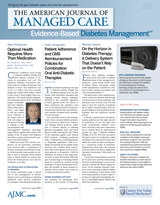- Center on Health Equity & Access
- Clinical
- Health Care Cost
- Health Care Delivery
- Insurance
- Policy
- Technology
- Value-Based Care
Recommendation on Anticoagulants Part of Latest Round of ASH Choosing Wisely Initiative
A call for limiting how long to use anticoagulants after an initial venous thromboembolism was included on the second list of tests and treatments to question as the American Society of Hematology (ASH) issued a fresh set of recommendations under the Choosing Wisely initiative.1
This year’s list was announced at the start of the 2014 ASH Annual Meeting that convened at the Moscone Center in San Francisco, California. The first round of recommendations,
numbers 1 through 5, were announced December 4, 2013, at the last ASH meeting in New Orleans, Louisiana. Details of recommendations 6 through 10 were presented at a
session December 8, 2014.
Mark Crowther, MD, MSc, of McMaster University in Hamilton, Ontario, Canada, discussed the recommendation, “Don’t use anticoagulants for more than 3 months in patients with a first venous thromboembolism (VTE) occurring in the setting of a major transient risk factor.” Crowther described this recommendation as a basic calculation of benefit-versus-risk: a VTE triggered by a major
event, such as surgery, presents a low risk for recurrence once the major event has passed and recovery has occurred, assuming adequate care and anticoagulant therapy. Subsequently, such
patients have a low risk of thrombosis, “and have the same risk of bleeding as other patients.”
The ASH recommendation does not apply to VTE linked to non-major risks, such as pregnancy or travel-associated immobility. Choosing Wisely is the initiative of the American Board of Internal Medicine Foundation that asks each specialty to identify tests or treatments that might be overused and unnecessary, with the potential to harm patients. While saving healthcare dollars is not the only consideration of Choosing Wisely, its efforts will have that effect if patients and their doctors are more judicious in their medical decisions. Other ASH Choosing Wisely recommendations
are:
• Don’t perform baseline or routine surveillance computed tomography scans in patients with asymptomatic, early-stage chronic lymphocytic leukemia. This recommendation
incorporates a theme heard this year at ASH about overuse of scans, which has been a broad theme across managed care and cancer care especially.
• Don’t test or treat for suspected heparin-induced thrombocytopenia in patients with a low pre-test probability. Adam C. Cuker, MD, MS, of the University of Pennsylvania, described the “4T” score, a widely used system that allows clinicians to evaluate the timing of a degree of thrombocytopenia and whether it might be caused by heparin. Cuker said this is one of the tough calls in
medicine: for one, a patient is taken off heparin and other anticoagulants are much more expensive.
• Don’t treat patients with immune thrombocytopenic purpura in the absence of bleeding or low platelet count. Cindy R. Neunert, MD, of Georgia Regents University, noted that this ASH recommendation applies to adults and that pediatric cases have difficult criteria. Treatment should be aimed at improving quality of life without exposing patients to unnecessary risks and is
always conditioned on prior bleeding episodes, activity levels, and social factors.
Reference
1. Hicks LK, Bering H, Carson KR et al. Five hematologic tests and treatments to question. Hematology. 2014;2014:599-604.

Building Trust: Public Priorities for Health Care AI Labeling
January 27th 2026A Michigan-based deliberative study found strong public support for patient-informed artificial intelligence (AI) labeling in health care, emphasizing transparency, privacy, equity, and safety to build trust.
Read More
Ambient AI Tool Adoption in US Hospitals and Associated Factors
January 27th 2026Nearly two-thirds of hospitals using Epic have adopted ambient artificial intelligence (AI), with higher uptake among larger, not-for-profit hospitals and those with higher workload and stronger financial performance.
Read More
Motivating and Enabling Factors Supporting Targeted Improvements to Hospital-SNF Transitions
January 26th 2026Skilled nursing facilities (SNFs) with a high volume of referred patients with Alzheimer disease and related dementias may work harder to manage care transitions with less availability of resources that enable high-quality handoffs.
Read More
Specialty and Operator Status Influence Electronic Health Record Use Variation
January 22nd 2026Operators demonstrated specialty-specific differences in electronic health record efficiency, timeliness, and after-hours use, highlighting how workflow and training shape documentation behaviors across medical disciplines.
Read More

